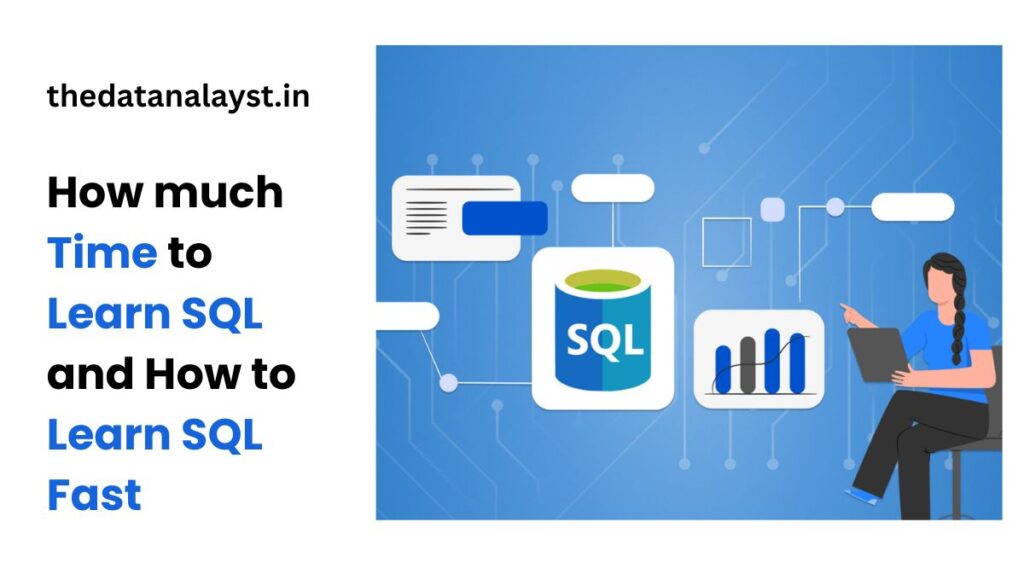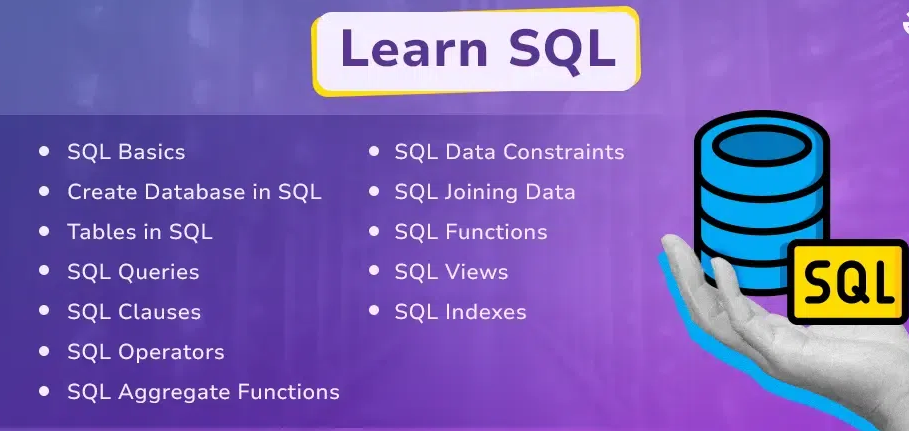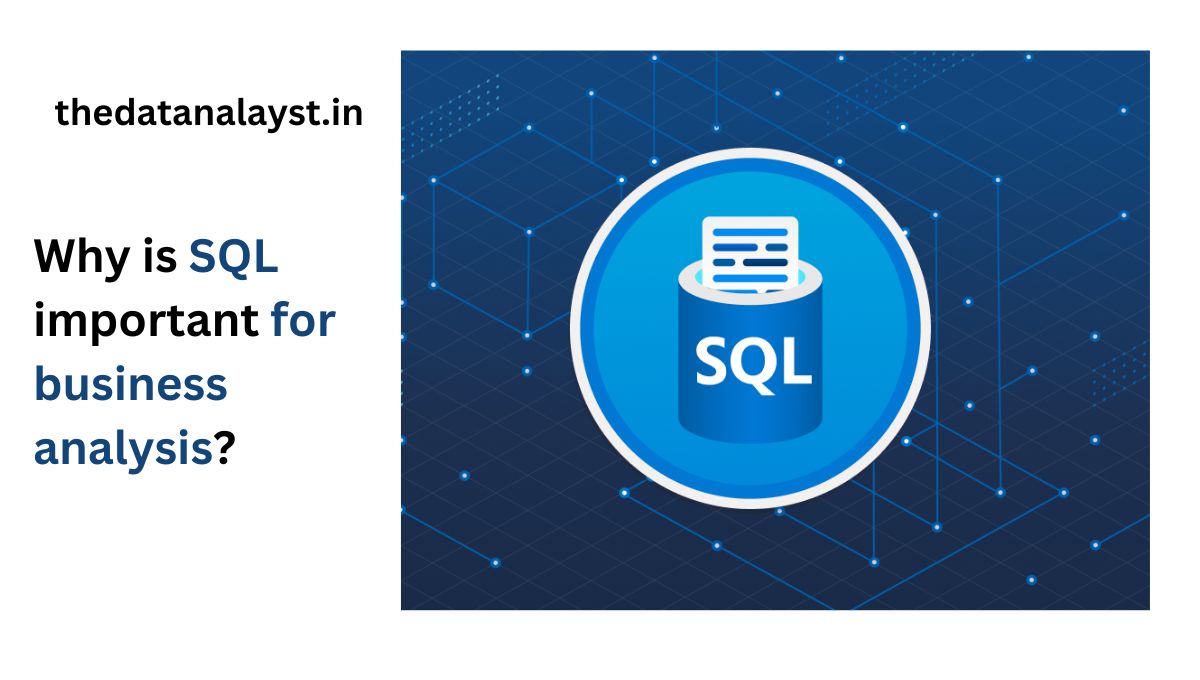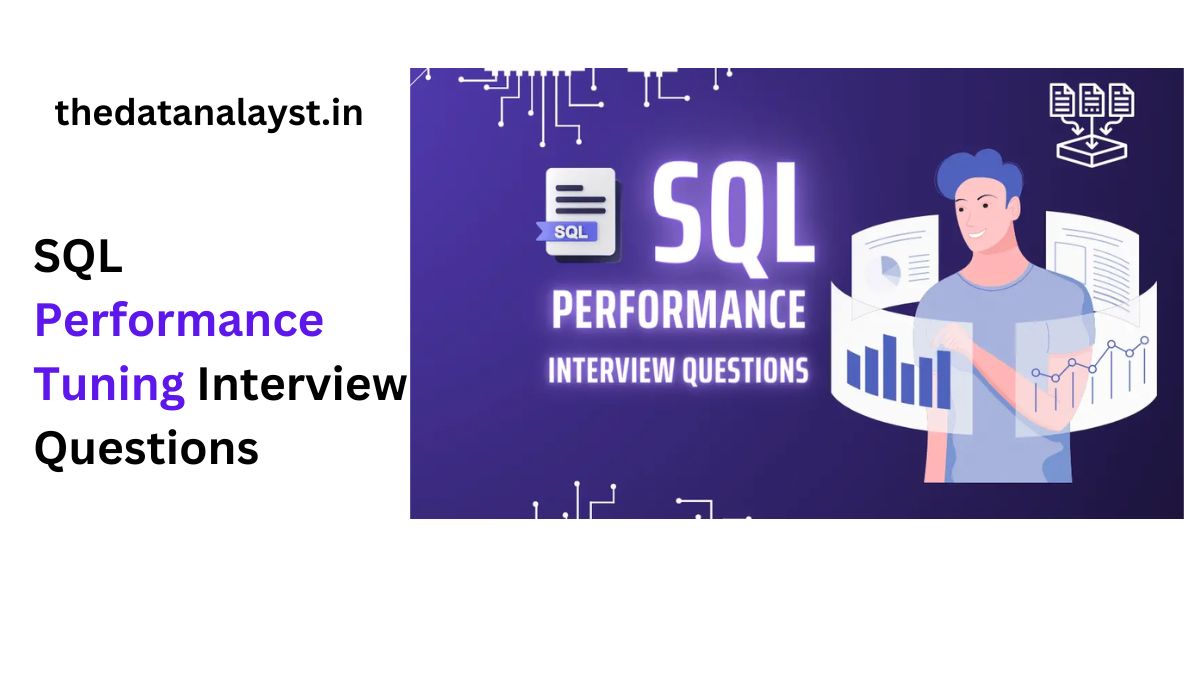SQL Or Structured Query Language is one of the most in-demand skills for anyone looking to break into data analysis, data science, or even web development if you work with backend.
In fact, a significant percentage of data analysis, data science, and database management roles require SQL knowledge, making it a valuable investment for your career. According to job market data, SQL is consistently listed as a top technical skill for data roles, with demand that spans across industries
In this article we will understand how long does it take to learn SQL, and how can you speed up the process?

How Long Does It Take to Learn SQL?
Well the short answer is: it depends. While some people might pick up the basics in a few weeks, others may take longer but on an average you can master SQL in 3 to 6 months depending your experiencing and understanding of programing.
To understand easily consider that it typically takes 1–2 weeks to learn SQL basics, 1–2 months to become comfortable with more complex queries, and 3–6 months to master advanced concepts like optimization and performance tuning.
It all depends upon the roadmap and the topics you need to learn .

Here’s a breakdown based about How Long Does It Take to Learn SQL on different levels of proficiency:
Learning Basics (1–2 weeks)
If your goal is to become familiar with simple queries such as SELECT, INSERT, UPDATE, and DELETE, you can learn the basics in as little as 1 to 2 weeks. With consistent practice, you’ll be able to work with simple databases and retrieve information from tables.
For a jumpstart, you will it helpful to work through interactive tutorials on sites like SQLZoo or Mode Analytics. These hands-on tools allow you to practice simple queries and immediately see results, reinforcing your understanding of basic SQL commands.
Intermediate Level Proficiency (1–2 months)
To become more comfortable with complex queries, joining multiple tables, using functions like GROUP BY and HAVING, and learning about indexing and optimization, you’re looking at about 1 to 2 months of dedicated learning.
Using platforms like LeetCode or HackerRank to solve SQL challenges can help you gain confidence as you work through increasingly complex queries.
Master Of SQL (3–6 months)
For mastering more advanced topics like complex subqueries, window functions, stored procedures, and database performance tuning, you’ll need 3 to 6 months. This will also include more practice on real-world problems and hands-on projects.
Mastering SQL is achievable by working on real-world projects and datasets, where you’ll learn to solve common business challenges.
For instance, analyzing sales data or customer behavior can deepen your understanding of optimization techniques and window functions. Additionally, learning indexing and query performance tuning will give you the edge in efficiently managing large datasets.
Factors That Will Affect Your SQL Learning Curve
- Prior Experience: If you’re familiar with databases, programming, or data analysis, you’ll likely pick up SQL much faster. Familiarity with databases, programming, or data analysis speeds up SQL learning.
- Practice Time: SQL is easy to grasp but requires practice to fully master. Regular practice, like dedicating 1–2 hours daily, can accelerate the process
- Learning Resources: High-quality resources such as interactive tutorials, courses, and real-life projects can make a significant difference, interactive tutorials and hands-on projects, can help you grasp SQL much faster
How to Learn SQL Fast
If you’re short on time or want to become good at SQL fast, here are some tips to help you speed up the process:
- Start with the Basics and Build Slowly
Focus on learning the core ideas first. Begin by understanding what SQL is used for, and then learn basic commands likeSELECT,FROM,WHERE,JOIN, andORDER BY. Don’t rush into complex queries until you’ve mastered the basics. Building a strong foundation allows you to progress confidently. - Use Interactive SQL Lessons
Platforms like SQLZoo, Mode Analytics, and SQLBolt offer hands-on lessons that let you write code and receive feedback instantly. These tools are ideal for active practice, especially if you’re short on time - Work on Real-Life Projects
Practice SQL with real data, such as public datasets or mock business scenarios. Working on real-world projects, such as analyzing sales data or creating customer segments, helps you understand SQL’s practical applications - Master Common SQL Tasks
Focusing on frequent SQL tasks like data filtering (WHERE), summarization (GROUP BY,SUM,COUNT), and result ordering (ORDER BY) will ensure that you’re well-prepared for daily SQL challenges. - Keep Practicing Regularly
Like any skill, practice is important. Set up a daily routine to work on SQL exercises. Use websites like Mode Analytics and SQLBolt to strengthen your knowledge. - Join SQL Communities
Be part of SQL communities on sites like Stack Overflow, Reddit, and GitHub. These are great places to find resources, get help, and learn from others. - Learn How to Optimize SQL Early
Learning how to write efficient queries early on will save you time later. Understand indexing, query execution plans, and how to avoid mistakes like slow joins or fetching too much data.
RELATED – ROADMAP TO LEARN SQL
FAQ SQL
Can I learn SQL in a month?
Yes, you can learn SQL to an intermediate level within a month if you dedicate time each day to practice. In a month, you should be comfortable with more complex queries, such as joins, aggregations, and filtering, and start working with multiple tables.
Is SQL hard to learn without a programming background?
SQL is often easier to learn than traditional programming languages because it is a query language focused on data retrieval and manipulation. Many people with no programming experience find SQL accessible, especially with consistent practice and the right resources
How much time should I spend each day learning SQL?
Spending 1–2 hours a day on SQL practice can yield good progress, especially if you’re aiming to reach intermediate proficiency within a month or two. The more regularly you practice, the faster you’ll become comfortable with SQL commands and database structures
Do I need to know advanced SQL to get a job in data analysis?
For many entry-level data analysis roles, basic to intermediate SQL knowledge is sufficient. However, understanding more advanced SQL concepts like joins, aggregations, and window functions can improve your job prospects and make you a more competitive candidate.
Can I learn SQL on my own?
Yes, SQL is highly self-study-friendly. Many online resources, tutorials, and free courses are available for self-learners, including platforms like SQLZoo, Codecademy, and YouTube tutorials that cover everything from basics to advanced topics.
Do I need to know SQL if I’m learning Python or R for data analysis?
Knowing SQL is very beneficial if you’re learning Python or R, as SQL is frequently used to retrieve data for analysis. SQL and Python/R often work together, where SQL is used for data extraction and Python or R is used for analysis and visualization.
Conclusion
Learning SQL is a valuable investment in your future, whether you’re aiming for a career in data analysis, data science, or web development. While the time it takes to learn SQL can vary depending on your background and dedication, it’s a skill that can be mastered with consistent practice.
Remember, the key to mastering SQL is not just memorizing commands but understanding how to use them in real-world scenarios. By starting with the fundamentals, building your skills step-by-step, and working on practical projects, you’ll be able to confidently handle data and make data-driven decisions.
So, take the first step today, dedicate time to practice regularly, and soon enough, you’ll be wielding SQL like a pro. With each query you write, you’ll unlock the power to work with data in transformative ways—and that’s a skill worth investing in!

